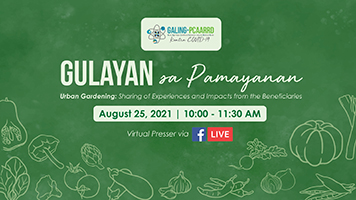
A total of 19 communities and 345 families benefit from Gulayan sa Pamayanan, an urban gardening project led and organized by two Department of Science and Technology (DOST) agencies: the Philippine Council for Agriculture, Aquatic and Natural Resources Research and Development (DOST-PCAARRD) and DOST-National Capital Region (DOST-NCR).
This was shared during the Gulayan sa Pamayanan virtual presser themed, “Urban Gardening: Sharing of Experiences and Impacts from the Beneficiaries,” held on August 25, 2021 streamed on DOST-PCAARRD’s Facebook page.
The project distributed urban gardening materials and trained residents in Metro Manila on two technologies - Enriched Potting Preparation (EPP) and Simple Nutrient Addition Program (SNAP) Hydroponics. Dr. Eduardo P. Paningbatan, Jr., retired professor from the University of the Philippines Los Baños, developed the EPP while Dr. Primitivo Jose A. Santos and Dr. Eureka Teresa M. Ocampo of UPLB-Institute of Plant Breeding (IPB) developed the SNAP hydroponics technology. Both also served as resource persons during the trainings conducted in the barangays.
EPP is a technology that only requires recyclable soft drink bottles as plant pots, a potting medium, coco coir, and the compost soil extract (CSE), which is formulated by Dr. Paningbatan. CSE provides nutrients to herbs, vegetables, and ornamental plants, which can be planted using EPP.
SNAP hydroponics uses recycled styrofoam boxes, styro cups, growing media composed of coco peat, carbonized rice hull, saw dust, and fine sand, plus the SNAP A and B nutrient solutions, which similar to CSE, they provide nutrients to the plants.
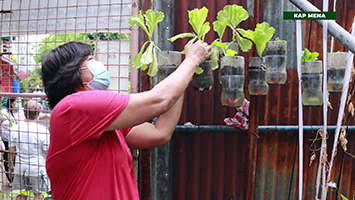
According to DOST-PCAARRD Executive Director Reynaldo V. Ebora, project beneficiaries were selected based on the Community Empowerment thru Science and Technology or CEST program of DOST, which hopes to provide livelihood and alleviate poverty in remote communities.
“The Gulayan sa Pamayanan project was initially identified to assist the seven communities however, this number ballooned to 19 communities, which is still aligned with our goal to increase vegetable availability in Metropolitan areas,” said Dr. Ebora.
The 19 communities mentioned are Muntaparlas (Brgy. CAA, Las Piñas; Brgy. BF Homes, Phase 3, Parañaque City; Don Bosco, Parañaque City; Doña Rosario Heights and Paradise Garden group of Sucat, Muntinlupa City; and GAD, MCTI, Putatan, Muntinlupa City), Pamamazon (Brgy. 412, Sampaloc, Manila; Claro M. Recto High School, Brgy. 412, Sampaloc, Manila, and Brgy. Pildera, Pasay City), Pamamarisan (Brgy. Nangka, Brgy. Concepcion, THAI, Brgy. Concepcion Uno, Fortune, and CEMO of Marikina City), and Camanava (Brgy. Pasolo, Brgy. Balangkas, Brgy. Tanza 1, and Brgy. Tanza 2, Navotas City.
Attaining the goal of food security in the community
A total of 3,950 EPP kits and 2,350 SNAP kits were distributed to the communities. Moreover, 180 bags of compost, 55 pcs of tower/vertical gardens with EPP vessels, eight coco coir net greenhouse, 1,000 liters of CSE, 100 sets of SNAP A and B Solutions, and 10 packs of plastic lining were distributed to 345 families.
To increase success of the project, the beneficiaries were trained on the EPP and SNAP hydroponics technologies, including seedling propagation and preparation. A total of 250 beneficiaries were trained.
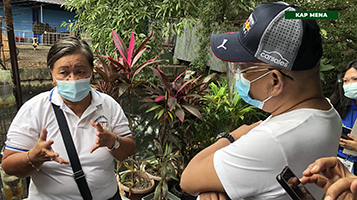 Three beneficiaries shared the benefits they gained from the Gulayan sa Pamayanan project. Filomena G. Cinco, Brgy. 412 chairperson and leader of the “Nagkakaisang mamamayan ng Legarda,” shared that they were interested in livelihood projects especially that their constituents were displaced and lost their livelihood during the pandemic.
Three beneficiaries shared the benefits they gained from the Gulayan sa Pamayanan project. Filomena G. Cinco, Brgy. 412 chairperson and leader of the “Nagkakaisang mamamayan ng Legarda,” shared that they were interested in livelihood projects especially that their constituents were displaced and lost their livelihood during the pandemic.
“Sa Barangay 412, hindi na po lumalabas ang mga tao dahil nandito na po ang kanilang hanapbuhay. Higit sa lahat, ang laking naitulong ang Gulayan sa Pamayanan kasi marami po kaming nakakain at shinashare pa po namin ito. Naging malusog at malakas ang resistensya ng aming mga mamamayan. Ang mga sobrang harvest naming ay pinamimigay o dinodonate namin,” said Cinco.
Meanwhile, Anita Pascual, president of Win Mother Community Group in Brgy. Balangkas, Valenzuela City, shared that through the Gulayan sa Pamayanan project, they were able to organize several communities composed of women, solo parents, youth, and men who had assigned garden plots. Their group was able to secure a compost bioreactor from DOST that helped them to hasten compost-making.
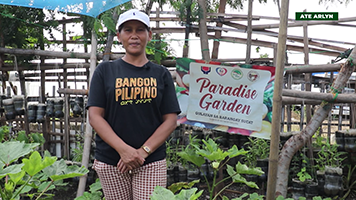 Prior to using the bioreactor, Pascual said that compost-making was labor-intensive and can only produce a limited number of sacks of composts. With the bioreactor, Pascual said that compost production increased tenfold. Pascual said that she is grateful for the assistance and the knowledge gained from the project.
Prior to using the bioreactor, Pascual said that compost-making was labor-intensive and can only produce a limited number of sacks of composts. With the bioreactor, Pascual said that compost production increased tenfold. Pascual said that she is grateful for the assistance and the knowledge gained from the project.
Arlyn Godinez, community leader of Paradise Garden in Brgy. Sucat, Muntinlupa City, shared that their 43 members who are all beneficiaries of Pantawid Pamilyang Pilipino Program or 4Ps were able to obtain materials as well as knowledge in gardening.
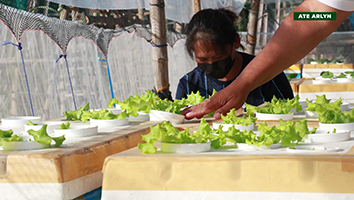 “Alam nyo pag nagtanim kayo, may maiuuwi kayong gulay sa pamilya ninyo. Safe ang gulay dahil alam nyong walang pesticide. Sa City Hall, nakakabenta kami ng gulay at mas lumaki ang income namin. Sa SNAP Hydroponics, kumikita kami ng P5,000 kada cycle,” shared Godinez.
“Alam nyo pag nagtanim kayo, may maiuuwi kayong gulay sa pamilya ninyo. Safe ang gulay dahil alam nyong walang pesticide. Sa City Hall, nakakabenta kami ng gulay at mas lumaki ang income namin. Sa SNAP Hydroponics, kumikita kami ng P5,000 kada cycle,” shared Godinez.
According to Raffy Sevilla, Barangay Sucat Chairperson, the project provided the community an alternative food source especially during pandemic. He said that through facilitated effort of DOST, they were able to secure seedlings of different vegetables, which they distribute to the community. “Malaki ang pakinabang namin sa DOST, hindi lang sa mga kagamitan lalo’t higit sa transfer of technology – sa ideas,” he said.
Arlu Cabañero, a teacher at Pasolo Elementary School, also shared his testimonial as Gulayan sa Paaralan focal person. He said that farming was not new to him as his parents were both farmers. As the focal person, he wanted to create awareness among his Grade 6 pupils regarding agriculture and food production.
He was also able to gain knowledge on the different methods and technicalities of urban gardening, which he also shared with his community, how he can help them during this time of pandemic. “Nagpapasalamat ako sa DOST-NCR at DOST-PCAARRD sa pagbibigay sa amin ng tiwala dahil hindi po lahat ay nabibiyayaan ng ganitong klaseng opportunidad,” he said.
